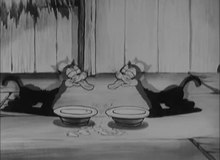Ain't she sweet
Ain't She Sweet is a pop and jazz standard from 1927. It was written by Milton Ager (music) and Jack Yellen (text) during the Tin-Pan-Alley phase and in Germany is mainly in the version of Beatles as well as known as the theme song of the Knoff Hoff Show .
History of origin
Milton Ager (1893-1979) was a professional music composer who registered his first works for copyright protection in 1915 ( Rockaway Hunt ). After his military service, he got a job in 1918 with the music publisher Leo Feist. In August 1922, Ager began a partnership with the composer Jack Yellen (1892-1991), which they ended in 1930. In 1927 they delivered five successful compositions; the most successful of these was Ain't She Sweet as Charleston . Ager was inspired by his daughter Shana Alexander for the simple text . The copyright was held by Edwin H. Morris & Co. Inc. ( Warner Brothers ).
Original recording
The original is often attributed to Ben Bernie in the literature ; Based on the recording dates, however, Lou Gold & His Melody Men turns out to be the original interpreter of the piece. His recording was made on January 17, 1927 (Silvertone # 5033), but it did not make it into the charts any more than a second recording as Lou Gold & His Orchestra for Perfect Records (# 14777) on February 21, 1927 with Scrappy Lambert (vocals) .
Cover versions
Ben Bernie & His Hotel Roosevelt Orchestra had great success with the song. His recording was made ten days after Lou Gold's on January 27, 1927. It was pressed onto the B-side (A-side: I'm Looking Over a Four Leaf Clover ; Brunswick # 3444). The B-side turned out to be more successful; it reached first place on the pop hit parade and held it for four weeks. This was an early example of how a B-side could rank independently of the A-side and even do better.
A large number of other cover versions appeared in the first half of 1927 . Harry Richman was in the studio just one day later as Bernie's orchestra when his version was recorded on January 28, 1927. Nat Shilkrets orchestra followed on March 10, 1927, only five days later Gene Austin , who reached number 4 in the charts with his version created on March 15, 1927. Frank Banta's piano solo from April 15, 1927 ( Victor # 20610) remained without hit parade resonance, Richard M. Jones ' Jazz Wizards stood in front of the microphones on May 6, 1927. Paul Whiteman's Rhythm Boys followed with a medley ( Mississippi Mud ) in the studio on June 20, 1927, the Brussels jazz band Charles Remue & His New Stompers recorded their version on July 28, 1927 in London.
In the year of the original version, the German version was recorded under the title Mir geht's gut with the tenor Max Kuttner and the Jazz Symphony Orchestra in October 1927. On May 13, 1927, a stock market crash in Berlin shocked all of Germany (see Black Thursday ). The encouraging German text referred to the stock market crisis: "I'm fine, I don't lose heart, whether I have money or just broke, I'm fine". Jazz versions were created by Bill Coleman , Benny Carter , Tommy Dorsey , the Dukes of Dixieland , Jimmy Lunceford , Meade Lux Lewis , Ben Webster and Erroll Garner . Frank Sinatra recorded the piece in 1962.
The first rock 'n' roll interpretation comes from Gene Vincent and is included on his first album Blue Jean Bop , released on August 13, 1956. Coverinfo lists a total of 44 versions of the title.
The Beatles version

The Beatles took their rock 'n' roll version, based on the 1956 recording by Gene Vincent, either on June 22, 1961 in the Friedrich-Ebert-Halle or on June 24, 1961 in the Studio Rahlstedt (Rahlau 128, Hamburg-Tonndorf ) with the line-up of John Lennon (vocals and rhythm guitar), Paul McCartney (electric bass), George Harrison (lead guitar) and Pete Best (drums) under the direction of producer Bert Kaempfert . In Great Britain the piece was not published until May 29, 1964. Tony Sheridan was not involved in the recording, Stuart Sutcliffe left the Beatles in June 1961. While all previous Polydor singles from Hamburg missed the British charts, the Beatles version of Ain't She Sweet reached 29th place on the New Musical Express - Hit parade.
In the USA , Atco Records brought the Beatles version onto the market on July 6, 1964, which rose to number 19 on the Billboard charts. Both versions were brought onto the market with an attempt to free-rider to participate in the Beatles' long-running record success, but this failed.
Individual evidence
- ↑ The wind whistles in your wallet. In: Badische Zeitung . November 8, 2008. Heinz Rühmann and Herta Feiler recorded a title of the same name for Odeon (# 4629) on November 2, 1940 , which was, however, a traveling song.
- ↑ Cover info entry about Ain't She Sweet.
- ^ Walter Everett: The Beatles as Musicians. The Quarrymen through Rubber Soul. Oxford Univ. Press, Oxford et al. 2001, ISBN 0-19-514104-0 , p. 95.
- ^ Mark Lewisohn : The Complete Beatles Chronicle. The only definitive guide to the Beatles' entire career. Hamyln, London 2004, ISBN 0-681-02890-4 , p. 42 f.
- ^ John C. Winn: Way Beyond Compare. The Recorded Beatles' Legacy. Volume 1: 1957-1965. Three Rivers Press, New York NY 2008, ISBN 978-1-299-13055-5 , p. 5.
- ^ Ian MacDonald: Revolution in the Head. The Beatles' Records and the Sixties. 3rd edition. Chicago Review Press, Chicago 2007, ISBN 978-1-55652-733-3 , p. 47.
- ↑ Bill Harry: The Ultimate Beatles Encyclopedia. Edition Olms, Zurich 1993, ISBN 3-283-00269-X , p. 13.
Web links
- Ain't She Sweet at Songfacts.com (English)

